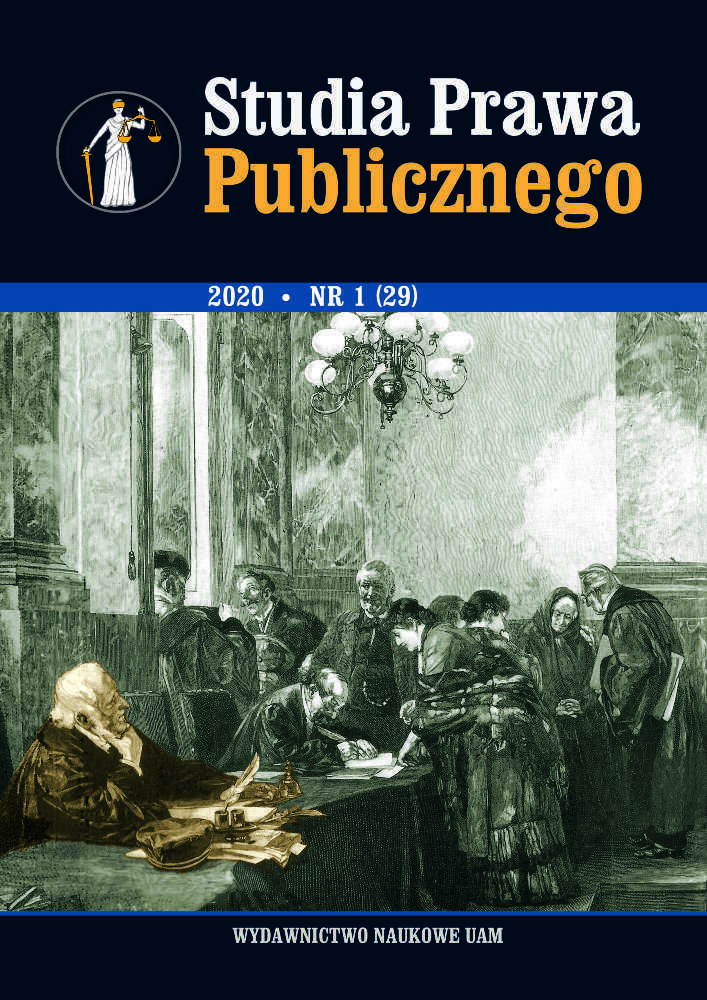Abstrakt
Operations under the auspices of the Security Council mandate span over 70 years. Repeatedly involved in resolving armed conflicts, they have made a significant contribution to ensuring security and stability around the world. In practice, they have taken the form of operations by individual states, coalitions, other international organizations or simply as United Nations missions composed of contingents provided by Troop Contribution Countries (TCC). While operations under the auspices of the United Nations have been involved on several occasions in offensive activities under Chapter VII of the Charter of the United Nations, and the question of responsibility for these actions has been the subject of many legal analyses and judgments, missions organized by the United Nations are always recognized as neutral, and their activities as conciliatory and focused on monitoring the cessation of hostilities, or supervising the disengagement between the parties of the conflict, with the use of force limited to self-defence. Thus, such operations benefited from legal protection, and any action against them was considered a violation of international law. The current engagement of United Nations goes far beyond the traditional understanding of peacekeeping operations. UN missions are frequently authorized to employ all necessary means, up to and including the use of lethal force or even neutralization of the armed group. This creates a situation where in the light of International Humanitarian Law, such actions can be recognized as involvement in armed conflict. This article is intended to show the problems that the international community will soon face to in using United Nations’ missions as an instrument for resolving armed conflicts and as a tool for restoring peace and providing stability and security
in the area of operations. It presents the processes of decision-making and subordination, which in some circumstances might result in the United Nations missions being deprived of legal protection and, in addition, made liable for non-compliance with the provisions of International Humanitarian Law.
Bibliografia
Arai-Takahashi Y., The Intervention Brigade. The Intervention Brigade Within The MONUSCO. The Legal Challenges of Applicability and Application of IHL, „Questions of International Law” 2015, no. 5.
Boelaert-Suominen S., Commentary: The Yugoslav Tribunal and the Common Core of Humanitarian Law Applicable to All Conflicts, „Leiden Journal of International Law” 2000, no. 13.
Both M., Dorschel T., The UN Peacekeeping Experience, w: The Handbook of the Law of Visiting Forces, pod red. D. Flecka, Oxford 2001.
Czaplińska A., Odpowiedzialność organizacji międzynarodowych jako element uniwersalnego systemu odpowiedzialności międzynarodowej, Łódź 2014.
Czapliński W., Odpowiedzialność państwa członkowskiego za akty organizacji międzynarodowych, „Ruch Prawniczy, Ekonomiczny i Socjologiczny” 2006, R. 68, z. 2.
Engdahl O., A Rebuttal to Eric David, „International Review Red Cross” 2014, no. 95.
Ferraro T., The Applicability and Application of International Humanitarian Law to Multinational Force, „International Review of the Red Cross” 2013, vol. 95.
Fink J.E., From Peacemaking to Peace Enforcement: The Blurring of the Mandate for the Use of Force in Maintaining International Peace and Security, „Maryland Journal of International Law and Trade” 1995, no. 19.
Gill T.D., Legal Aspects of the Transfer of Authority in UN Peace Operations, „Netherlands Yearbook of International Law” 2011, vol. 42.
Henckaerts J.M. (red.), ICRC, Commentary on the First Geneva Convention: Convention (I) for the Amelioration of the Condition of the Wounded and Sick in Armed Forces in the Field, pod red. J.M. Henckaertsa, 2nd ed., 2016.
Higgins R., The Legal Consequences for Member States of the Non-Fullfilment by International Organizations of their Obligations Toward Third Parties, „Annuaire de l’Institut de droit international” 1995, 66-1.
Hirsch M., The Responsibility of International Organizations Towards Third Parties, Dordrecht– Boston–London 1995.
Kolb R., Applicability of International Humanitarian Law to Forces Under the Command of an International Organization, w: Report: Expert Meeting on Multinational Peace Operations Applicability of International Humanitarian Law and International Human Rights Law to UN Mandated Forces, pod red. A. Faite’a, J. Labbe Greniera, Geneva 2004.
Kranz J., Standardy przypisania w kontekście międzynarodowej odpowiedzialności za użycie siły zbrojnej, „Kwartalnik Prawa Publicznego” 2009, nr 3–4.
Krzan B., Odpowiedzialność państwa członkowskiego z tytułu działalności organizacji międzynarodowych, Wrocław 2013.
Muller L., The Force Intervention Brigade – United Nations Forces Beyond the Fine Line Between Peacekeeping and Peace Enforcement, „Journal of Conflict & Security Law” 2015, vol. 20, no. 3.
Murphy R., UN Peacekeeping in Lebanon, Somalia and Kosovo: Operations and Legal Issues in Practice, Cambridge 2007.
Okimoto K., The Distinction and Relationship between Jus ad Bellum and Jus in Bello, Oxford 2011.
Orakhelashvili A., Overlap and Convergence: The Interaction Between Jus ad Bellum and Jus in Bello, „Journal of Conflict and Security Law” 2007, no. 12.
Pejic J., The Protective Scope of Common Article 3: More Than Meets the Eye, „International Review of the Red Cross” 2011, vol. 93.
Picket J., Commentary on the Geneva Convention for the Amelioration of the Condition of the Wounded and Sick in Armed Forces in the Field, Geneva 1952.
Sams K.E., IHL Obligations of the UN in International Missions, w: International Military Missions and International Law, „International Humanitarian Law Series” 2011, t. 31.
Seidl-Hohenveldern I., International Economic Law, wyd. 2, Dordrecht–Boston–London 1992.
Seyersted F., United Nations Forces in the Law of Peace and War, Leyden 1966.
Sheeran S., Case S., The Intervention Brigade: Legal Issues for the UN in the Democratic Republic of the Congo, International Peace Institute, November 2014.
Sheeran S.P., A Constitutional Moment?: United Nations Peacekeeping in the Democratic Republic of Congo, „International Organizations Law Review” 2011, no. l.
Shraga D., The United Nations as an Actor Bound by International Humanitarian Law, „International Peacekeeping” 1998, no. 5.
Shraga D., Zacklin R., The Applicability of International Humanitarian Law to United Nations Peacekeeping Operations: Conceptual, Legal and Practical Issues, Report to the Symposium on Humanitarian Action and Peacekeeping Operations, 22–24 June 1994, ICRC, Geneva 2004.
Licencja
Prawa autorskie (c) 2020 Jacek Stochel

Utwór dostępny jest na licencji Creative Commons Uznanie autorstwa – Użycie niekomercyjne – Bez utworów zależnych 4.0 Międzynarodowe.

